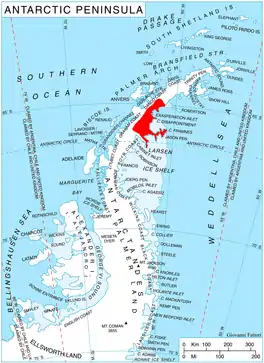Evans Glacier (Graham Land)
Evans Glacier (65°5′S 61°40′W) is a gently-sloping glacier 15 nautical miles (28 km) long and 4 nautical miles (7 km) wide, draining the southeast slopes of Travnik Buttress eastwards between Rugate Ridge and Poibrene Heights to flow into Vaughan Inlet on the east coast of Graham Land, Antarctica. It was discovered by Sir Hubert Wilkins in an aerial flight, December 20, 1928, and named "Evans Inlet" by him for E.S. Evans of Detroit. A further survey by the Falkland Islands Dependencies Survey in 1955 reported that this low-lying area is not an inlet, but is formed by the lower reaches of Hektoria Glacier and the feature now described.[1]

Further reading
- Defense Mapping Agency 1992, Sailing Directions (planning Guide) and (enroute) for Antarctica, P 276
- Wolfgang Rack, Dynamic Behavior and Disintegration of the Northern Larsen Ice Shelf, Antarctic Peninsula, Innsbruck, October 2000
- Jane G. Ferrigno, Alison J. Cook, Amy M. Mathie, Richard S. Williams, Jr., Charles Swithinbank, Kevin M. Foley, Adrian J. Fox, Janet W. Thomson, and Jörn Sievers, Coastal-Change and Glaciological Map of the Larsen Ice Shelf Area, Antarctica: 1940–2005, U.S. Geological Survey Geologic Investigations Series Map I–2600–B, 1 map sheet, 28-p. text.
- Etienne Berthier, Ted A. Scambos, Christopher A. Shuman, Mass loss of Larsen B tributary glaciers (Antarctic Peninsula) unabated since 2002 Archived 2020-03-28 at the Wayback Machine, GEOPHYSICAL RESEARCH LETTERS, VOL. 39, L13501, doi:10.1029/2012GL051755, 2012
External links
- Evans Glacier on USGS website
- Evans Glacier on SCAR website
- Evans Glacier on marineregions.org
References
![]() This article incorporates public domain material from "Evans Glacier". Geographic Names Information System. United States Geological Survey.
This article incorporates public domain material from "Evans Glacier". Geographic Names Information System. United States Geological Survey.